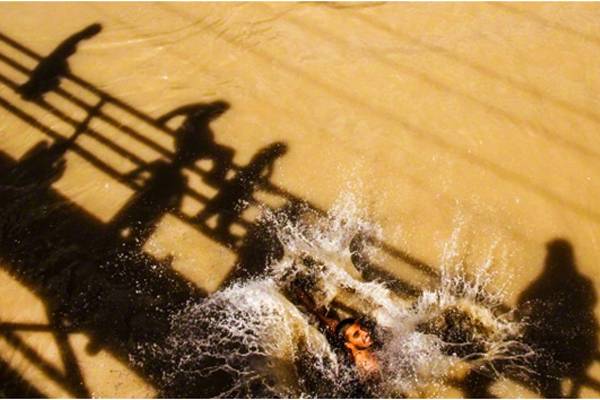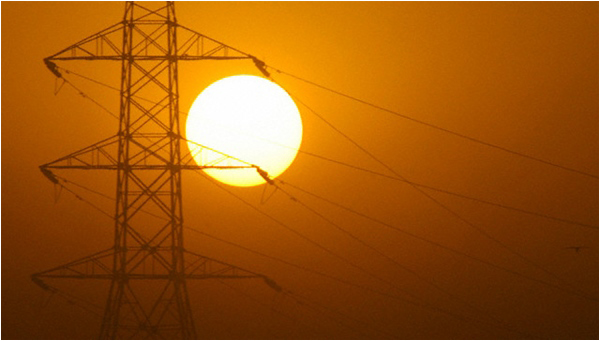
Worsened by a shortage of water and electricity, an unrelenting heat wave has killed hundreds of people in Karachi and the rest of Sindh, in what is being seen as the province’s worst weather related disaster in recent history.
The unexpected spell of heat began on Friday, and had killed more than 782 people in Karachi by Wednesday morning, including 35 infants. At least 38 people died of heat stroke in Hyderabad, Tando Allahyar, Thano Boola Khan and Badin city. Daytime temperature has been as high as 45 degrees centigrade (111 degrees Farenheit). The advent of heat wave coincided with the beginning of the holy month of Ramzan, when most Muslims fast.
There is no central authority to ascertain the death toll, but independent sources say the number of deaths is much higher than being reported from just the major hospitals and volunteer services, and many deaths are unreported. According to the Sindh Katchi Abadi Authority, there are 540 major slums in the city.
According to Edhi volunteers, a majority of the dead brought to their morgue did not belong to Karachi, and had come to the city for Ramzan. Every year, tens of thousands poor people from all over the country travel to Karachi during the holy month to gather alms.
“Most of the patients brought here were severely dehydrated and were in critical conditions,” Dr Seemin Jamali, head of Emergency at the Jinnah Postgraduate Medical Center (JPMC) said on the telephone. She said around 3,600 patients suffering from heat stroke were treated at the JPMC in the last three days.
With such a large number of sudden deaths, the storage, transportation and burial of dead bodies has become a problem. Morgues have declined to accept more bodies, and many of them have a limited capacity. The biggest of them is owned by Edhi Foundation, which can keep 250 to 300 bodies.
“We usually have less than 200 bodies in our cold storage. Many of them are unidentified. We keep them for their relatives to come and identify them,” said Anwar Kazmi, who works at the Edhi Foundation. But when the heat wave began, they received more than 300 bodies in a go. “Due to severe heat, relatives want to keep the bodies in storage so that they can prepare for the last rites,” he said. “We have buried most of the unidentified bodies to create some space, but even then we do not have the capacity to accept any more bodies.”
Many of Karachi’s 477 small and large graveyards refused to accept any more bodies. In others, prices of the graves shot up from up to Rs 5,000, to as high as Rs 50,000. Even ambulances that carry dead bodies raised their fares.
The Sindh government has announced a compensation for the victims, but there is no central authority that could ascertain the cause of death and make a list of all the victims.
Media reports say the problem was complicated by power outages. The Sindh government says Karachi Electric is to blame. Sindh Chief Minister Qaim Ali Shah told the provincial assembly that Karachi Electric failed to provide power to the city, and the federal government is responsible for the deaths. He announced a public holiday across the province in order to save power, and also directed the Karachi district government to close markets, wedding halls, restaurants and even half the streetlights by 9pm.
But the electric company’s authorities say there is no extraordinary loadshedding. The demand has increased, they say, and there is extra pressure on the system, but there is no unannounced loadshedding.
The Met office has said the intense weather was caused by an unusual weather event, when sea breeze from the Arabian Sea suddenly stopped. Dr Mohammad Hanif, a senior official at the Met Office, said the highest temperature in the city recorded this week was 45 degree Celsius – a 10-year record. “But it felt like 49 degree Celsius, due to the absence of the sea breeze, which is a unique event in the country’s recorded history.”

Dr Pervaiz Amir, an environmentalist, told reporters that the phenomenon was a consequence of global climate change.
Healthcare experts say that because of the unusual weather, people were not prepared. Many of them were fasting in Ramzan, going without water for up to 15 hours. Therefore, a noted cleric issued an edict that Muslims could suspend fasting because of the extreme weather. “Life is precious, and if due to heat or any other extreme weather condition, people are dying, then they can postpone fasting, which can be done later when weather conditions are favorable,” Mufti Naeem of Jamia Binoria in Karachi. He said Islam allows people not to fast when they are ill or traveling, and the elderly, the children, and the sick can stop fasting, if medicinal or physical conditions do not allow it.
City authorities meanwhile considered an unusual option – artificial rain. Artificial rain is brought about with cloud seeding – a process in which different chemicals are sprinkled on normal clouds. But the Met Office said that was not possible in Karachi, as the city’s atmosphere didn’t have a certain type of the clouds at a certain height necessary for cloud seeding.
Amar Guriro is Karachi based journalist
Twitter: @AmarGuriro
The unexpected spell of heat began on Friday, and had killed more than 782 people in Karachi by Wednesday morning, including 35 infants. At least 38 people died of heat stroke in Hyderabad, Tando Allahyar, Thano Boola Khan and Badin city. Daytime temperature has been as high as 45 degrees centigrade (111 degrees Farenheit). The advent of heat wave coincided with the beginning of the holy month of Ramzan, when most Muslims fast.
There is no central authority to ascertain the death toll, but independent sources say the number of deaths is much higher than being reported from just the major hospitals and volunteer services, and many deaths are unreported. According to the Sindh Katchi Abadi Authority, there are 540 major slums in the city.
Grave prices shot up from Rs 5,000 to Rs 50,000
According to Edhi volunteers, a majority of the dead brought to their morgue did not belong to Karachi, and had come to the city for Ramzan. Every year, tens of thousands poor people from all over the country travel to Karachi during the holy month to gather alms.
“Most of the patients brought here were severely dehydrated and were in critical conditions,” Dr Seemin Jamali, head of Emergency at the Jinnah Postgraduate Medical Center (JPMC) said on the telephone. She said around 3,600 patients suffering from heat stroke were treated at the JPMC in the last three days.
With such a large number of sudden deaths, the storage, transportation and burial of dead bodies has become a problem. Morgues have declined to accept more bodies, and many of them have a limited capacity. The biggest of them is owned by Edhi Foundation, which can keep 250 to 300 bodies.
“We usually have less than 200 bodies in our cold storage. Many of them are unidentified. We keep them for their relatives to come and identify them,” said Anwar Kazmi, who works at the Edhi Foundation. But when the heat wave began, they received more than 300 bodies in a go. “Due to severe heat, relatives want to keep the bodies in storage so that they can prepare for the last rites,” he said. “We have buried most of the unidentified bodies to create some space, but even then we do not have the capacity to accept any more bodies.”
Many of Karachi’s 477 small and large graveyards refused to accept any more bodies. In others, prices of the graves shot up from up to Rs 5,000, to as high as Rs 50,000. Even ambulances that carry dead bodies raised their fares.
"It feels like 49 degrees because of the absence of sea breeze - a unique event in the city's history"
The Sindh government has announced a compensation for the victims, but there is no central authority that could ascertain the cause of death and make a list of all the victims.
Media reports say the problem was complicated by power outages. The Sindh government says Karachi Electric is to blame. Sindh Chief Minister Qaim Ali Shah told the provincial assembly that Karachi Electric failed to provide power to the city, and the federal government is responsible for the deaths. He announced a public holiday across the province in order to save power, and also directed the Karachi district government to close markets, wedding halls, restaurants and even half the streetlights by 9pm.
But the electric company’s authorities say there is no extraordinary loadshedding. The demand has increased, they say, and there is extra pressure on the system, but there is no unannounced loadshedding.
The Met office has said the intense weather was caused by an unusual weather event, when sea breeze from the Arabian Sea suddenly stopped. Dr Mohammad Hanif, a senior official at the Met Office, said the highest temperature in the city recorded this week was 45 degree Celsius – a 10-year record. “But it felt like 49 degree Celsius, due to the absence of the sea breeze, which is a unique event in the country’s recorded history.”

Dr Pervaiz Amir, an environmentalist, told reporters that the phenomenon was a consequence of global climate change.
Healthcare experts say that because of the unusual weather, people were not prepared. Many of them were fasting in Ramzan, going without water for up to 15 hours. Therefore, a noted cleric issued an edict that Muslims could suspend fasting because of the extreme weather. “Life is precious, and if due to heat or any other extreme weather condition, people are dying, then they can postpone fasting, which can be done later when weather conditions are favorable,” Mufti Naeem of Jamia Binoria in Karachi. He said Islam allows people not to fast when they are ill or traveling, and the elderly, the children, and the sick can stop fasting, if medicinal or physical conditions do not allow it.
City authorities meanwhile considered an unusual option – artificial rain. Artificial rain is brought about with cloud seeding – a process in which different chemicals are sprinkled on normal clouds. But the Met Office said that was not possible in Karachi, as the city’s atmosphere didn’t have a certain type of the clouds at a certain height necessary for cloud seeding.
Amar Guriro is Karachi based journalist
Twitter: @AmarGuriro

